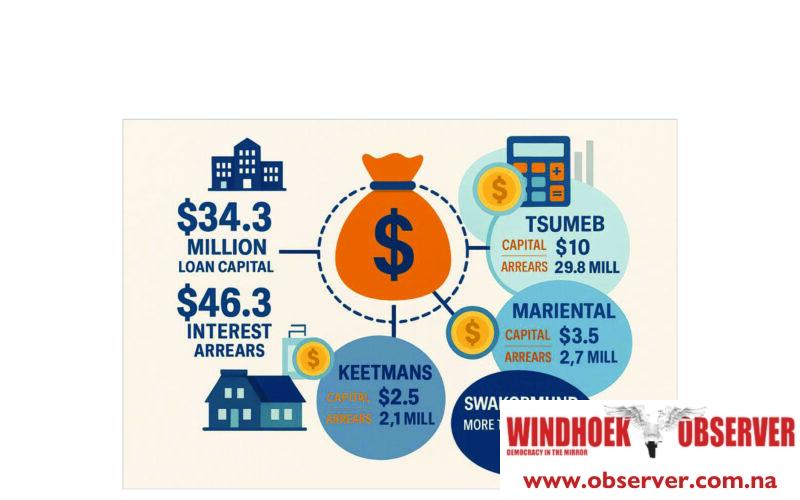Justicia Shipena
The Namibian government is sitting on billions in unpaid loans from municipalities, towns, villages, and public enterprises.
An auditor general’s latest report shows that local authorities and state entities continue to default on loans, deepening the country’s financial strain.
By March 2024, municipalities alone owed the government N$34.3 million in loan capital and a staggering N$46.3 million in interest arrears.
Tsumeb municipality had the highest debt, with N$10 million in unpaid capital and N$29.8 million in arrears. Mariental followed with N$3.5 million in capital and N$2.7 million in arrears.
Keetmanshoop owed N$2.5 million in capital and N$2.1 million in arrears, while Swakopmund owed more than N$1.6 million.
Towns and villages have not fared better
The report states that Lüderitz owes N$8.3 million in loan capital and N$18.4 million in arrears, while Maltahöhe owes N$1.2 million in capital and N$2.3 million in arrears.
Smaller towns such as Aranos, Bethanie, and Koes continue to carry debts with arrears ranging from hundreds of thousands to over N$800,000.
In total, towns and villages owe N$13.5 million in capital and nearly N$28 million in arrears.
According to Auditor General Junias Kandjeke, public enterprises and non-profit organisations also remain in debt.
Windhoek International School has failed to make any repayments on its loan, leaving a balance of N$16.9 million.
The troubled Namibia Meat Corporation (Meatco), which previously received government funding for its meat factory, continues to show an unresolved overpayment of N$5,581 dating back to 2003 and 2004.
Kandjeke in his report also indicated that government debt is also on the rise.
The ministry of finance manages billions in on-lending loans to entities such as NamWater, the pension fund, and housing projects.
By March 2024, these loans stood at N$558.9 million, with arrears climbing to more than N$406 million.
Funds returned to state coffers
At the same time, several ministries did not utilise the funds allocated to them, despite urgent service delivery challenges.
The report found that 29 government institutions underspent their budgets by a combined N$1.418 billion, which amounts to 1.96% of the national budget for 2023/24.
The ministry of works and transport, left N$94.8 million unspent , representing 15% of its allocation.
The ministry of labour returned N$30.8 million, or 14% of its budget, while the ministry of mines and energy left N$20.8 million unspent, close to 10% of its allocation.
The ministry of information and communication technology underspent by N$43.4 million, and the ministry of water by N$47.3 million.
Furthermore, the report also revealed that the ministry of health and social services underspent by N$41.2 million, while the ministry of home affairs, which has faced widespread criticism over passport and ID delays, left N$226 million unspent.
Kandjeke also noted that the state revenue fund, which serves as the government’s main account, recorded a deficit of N$5.2 billion by March 2024, more than double the N$1.9 billion deficit recorded the previous year.
He said the bulk of revenue came from tax collections of N$74.6 billion, followed by N$6.7 billion in non-tax revenue and N$64.4 billion from domestic borrowings, with an additional N$1.4 billion raised through foreign loans.
Despite these inflows, he said total expenditure reached N$144.2 billion, with N$67.8 billion spent on operations and N$5.8 billion on development projects.




